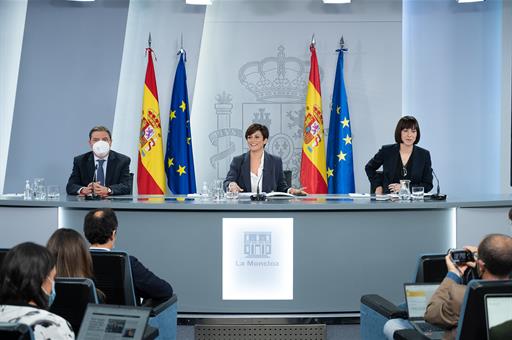The Government of Spain pushes through first law to combat food waste
Council of Ministers - 2021.10.11
Moncloa Palace, Madrid
The Council of Ministers has presented the Draft Bill on the Prevention of Food Loss and Waste, designed to bring about a drastic reduction in the waste of unconsumed food that ends up in the rubbish bin and to encourage its use.
The Minister for Agriculture, Fisheries and Food, Luis Planas, pointed out at the press conference following the meeting of the Executive that Spain is the third country in the European Union to legislate on food wastage, after France and Italy, although it has been campaigning for years in favour of healthy, safe, sustainable and affordable food.
Planas indicated that Spanish households threw away more than 1.3 billion kilos of uneaten food, an average of 31 kilos per person. In light of this data, the minister explained that the future law aims to tackle waste from three directions: economic, environmental and moral.
Throwing food away, the minister argued, means wasting the work of farmers and livestock breeders, the natural resources used to produce it, the soil, the water, and we forget about the emissions into the atmosphere generated in its production and the more than 800 million people who go hungry in the world. "There is no more expensive food product than the one that ends up in the rubbish bin," he stressed.
Hierarchy of use priorities
 Foto: Pool Moncloa/Borja Puig de la BellacasaThe regulation promotes actions to prevent food loss throughout the food chain, from harvest to consumption, and sets out a hierarchy where human food is prioritised.
Foto: Pool Moncloa/Borja Puig de la BellacasaThe regulation promotes actions to prevent food loss throughout the food chain, from harvest to consumption, and sets out a hierarchy where human food is prioritised.
The minister indicated that food that is approaching the "best before" date and the "use before" date indicated on the label can be sold, purchased and consumed and should not end up in the rubbish. The first priority is that they are donated to non-profit organisations or food banks to be consumed by people in need.
Food that is not sold but in optimal conditions for consumption will have to be transformed into other foods, such as juices, jams or creams. Where they are not fit for human consumption, they may be used as a by-product of animal feed manufacture, for industry, for composting or for biogas or other types of fuel.
Obligations of food chain operators
Luis Planas pointed out that there are products with an expired best before date, such as virgin olive oil, which are still consumable. These items should be presented to the consumer separately and clearly differentiated from the rest, with lower prices, or be donated.
Hospitality establishments, such as bars and restaurants, will have to offer their customers the possibility to take what they do not consume home at no additional cost.
Shops with a floor area of more than 400 square metres will have to provide a place to place products that are in perfect condition for consumption, but look bad. The minister gave fruit and vegetable that is poorly presented but consumable as an example.
The future law also envisages encouraging the sale of seasonal, local, organic and bulk foodstuffs.
522 million euros in aid for research projects and pre-doctoral contracts
The Minister for Science and Innovation, Diana Morant, explained that the Government has approved a total of 522 million euros for two of the most important calls of the State Plan for Scientific, Technical and Innovation Research 2021-2023, to which others will be added in the coming weeks.
Grants for knowledge generation projects
 Foto: Pool Moncloa/Borja Puig de la BellacasaDiana Morant specified that the call for knowledge generation projects will have a budget of 412 million euros.
Foto: Pool Moncloa/Borja Puig de la BellacasaDiana Morant specified that the call for knowledge generation projects will have a budget of 412 million euros.
The beneficiaries of this call, which is part of the State Programme to promote scientific and technical research and its transfer, are universities, public research organisations, public and private (non-profit) research and development centres.
The minister said that "for the second year running, the scientific community once again has a powerful means of funding to generate knowledge and specific solutions that will improve people's lives, the country's economy and solve the urgent challenges of the next decade".
The grants will support targeted research projects aimed at solving specific problems. Morant stressed that they will provide specific solutions for "the social, environmental and economic challenges of our country, which must move towards a greener, more egalitarian, digital and cohesive future".
Moreover, the call will fund non-oriented research projects, which aim at advancing knowledge, irrespective of their time horizon and scope. The minister gave science creating models that allowed us to predict the eruption of the volcano on La Palma as an example.
The projects will have a duration of three to four years and may involve early career researchers in the teams. "We want to create more recruitment opportunities for our young people at a time when it is most difficult for them, which is when they begin their research careers," the minister remarked.
Call for pre-doctoral contracts
The Government has authorised the advanced call by the State Research Agency in 2021 foraid for pre-doctoral contracts for the training of doctors, as part of the State Training Sub-programme of the State Programme to Develop, Attract and Retain Talent, for an amount of 110 million euros.
The minister explained that the call for applications will enable 1,100 researchers to be recruited over the next four years, who will carry out their doctoral theses in research projects of scientifically and academically solvent groups belonging to universities, public research organisations and other private non-profit centres. The Government's objective, she said, is "to retain our talent, so that the country feeds off the talent of our young people and so that they do not have to go abroad in search of opportunities".
This call also includes additional grants of 6,860 euros for each contracted researcher, which may be used to finance stays in R&D centres other than the one to which they are assigned and tuition fees for doctoral studies.
Diana Morant recalled that since Pedro Sánchez has led the Government, the salary of these pre-doctoral researchers has risen by 12%, thanks to the approval of the Statute for Pre-doctoral Research Staff in Training.
The minister also stressed that her department will have 3.843 billion euros available by 2022: "This means having doubled the Science and Innovation budget in just two years, or in other words, having a budget 100% more than in 2020".
Lifting of restrictions on accompanying persons at airports
 Foto: Pool Moncloa/Borja Puig de la BellacasaThe Government has agreed to abolish limits on access to airports, in line with decisions taken by the European terminal network.
Foto: Pool Moncloa/Borja Puig de la BellacasaThe Government has agreed to abolish limits on access to airports, in line with decisions taken by the European terminal network.
From now on, accompanying persons will be able to enter the terminals, although at peak times, limitations may be set to avoid large crowds. Hygiene regulations against COVID-19, such as the use of face masks, are still mandatory.
According to the spokesperson, the measure represents a return to normality "in terms of affection and personal and family relations", thanks to the good results of the Government's measures and the vaccination process.
The decision adopted today will be published next Thursday in the Official State Gazette and will enter into force the following day, Friday 15 October.
The terminal access restrictions, now lifted, were adopted in July 2020 and only allowed entry to passengers with a ticket within six hours before the flight or to accompanying minors or persons with reduced mobility.
Improving the Public Health Surveillance Network
 Foto: Pool Moncloa/Borja Puig de la BellacasaThe Council of Ministers has authorised the proposal for the territorial distribution of 13 million euros, for 2021, of appropriations managed by the regional governments for the Public Health Surveillance Network system, within the framework of the Recovery, Transformation and Resilience Plan (RTRP).
Foto: Pool Moncloa/Borja Puig de la BellacasaThe Council of Ministers has authorised the proposal for the territorial distribution of 13 million euros, for 2021, of appropriations managed by the regional governments for the Public Health Surveillance Network system, within the framework of the Recovery, Transformation and Resilience Plan (RTRP).
The Minister for Territorial Policy and Government Spokesperson, Isabel Rodríguez, has pointed out that the pandemic and the way in which it has been tackled and the response to the health crisis in Spain have highlighted those areas in which the public health system could be improved. "It is a clear example of the Government's willingness to improve and modernise public health by complementing funding for the regional governments," she added.
The European Union's RTRP provides for Component 18: Renewing and expanding the capacities of the National Health System, which aims to prepare the system to prevent and cope with potential global health threats such as COVID-19 and to increase public health capacities and epidemiological surveillance systems. Within this component, investment C18.I3 stands out: increasing capacities to respond to health crises, which includes the strengthening of surveillance capacities through the creation of a new information system for the Public Health Surveillance Network, at central and regional levels, which will expand, improve and integrate the existing information systems for communicable and non-communicable diseases in Spain.
The overall budget allocation for the new network system amounts to 27,400,000 euros, for state and regional investment.
The distribution of the 2021 budget appropriation is 13 million euros for the Regional Governments and Cities with a Statute of Autonomy, and will be carried out in accordance with these objective criteria: 40% on a linear basis, applying a minimum amount for each regional government and Ceuta and Melilla; 60% distributed by population criteria, according to official population figures from the revision of the municipal census at 1 January 2020.





